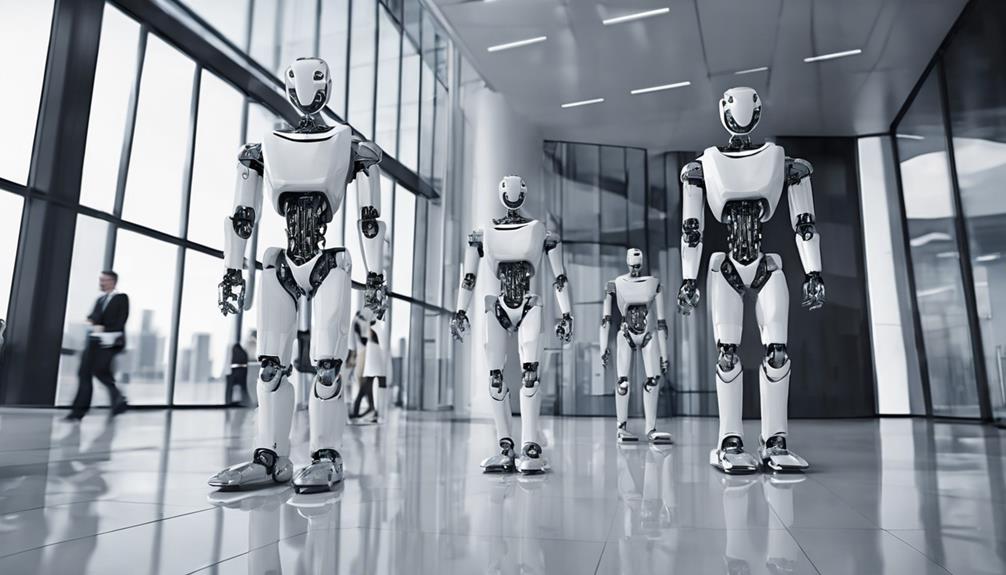As different sectors embrace the benefits of artificial intelligence, such as enhanced productivity and creativity, we are witnessing notable transformations in white-collar occupations. From automated data analysis to algorithm-driven legal research, the expansion of AI into fields once seen as secure for professionals calls for a careful examination of the upcoming work landscape.
The implications of this shift extend beyond individual job roles, raising pertinent questions about the socioeconomic fabric and educational paradigms that underpin our workforce. In exploring the nuanced interplay between technology and employment, we are compelled to confront the multifaceted repercussions of AI's ascent in reshaping the contours of white-collar jobs.
Key Takeaways
- White-collar professions like legal and science research face high risk of AI job displacement.
- Continuous learning and upskilling are crucial to adapt to AI technologies in white-collar roles.
- Creativity and critical thinking skills are key to staying relevant amidst AI advancements.
- Professionals must collaborate with AI systems to enhance expertise and navigate job market changes.
Impact of AI on White-Collar Roles
The proliferation of artificial intelligence (AI) technologies is significantly reshaping the landscape of white-collar professions. Particularly impacting roles traditionally held by knowledge workers such as software developers. AI tools like ChatGPT have raised concerns about potential job replacements in various white-collar professions. This technological revolution poses a significant risk to white-collar workers, unlike previous advancements.
Knowledge workers in fields such as legal, scientific research, and administration are particularly vulnerable to being replaced by AI systems that can perform tasks more efficiently and accurately. The threat of job loss looms over these professionals as AI technologies continue to advance rapidly.
As AI continues to evolve, white-collar workers must adapt to remain relevant in the workforce. While roles that involve a significant human element, like driving, child care, and in-person communication, are less susceptible to AI replacement, many other knowledge-based professions are at high risk.
To thrive in this changing landscape, white-collar workers must embrace upskilling, reskilling, and continuous learning to stay ahead of the curve and secure their place in the future job market.
Industries Facing Displacement

Industries across the white-collar sector are confronting the imminent reality of displacement as artificial intelligence technologies advance at a rapid pace, posing a substantial threat to traditional roles in legal, scientific research, and administration. According to labor data, legal professions face a high risk of obsolescence, with a potential 78% of jobs being replaced by AI by 2023. Similarly, science researchers have a significant risk, with 61% of roles facing displacement due to AI advancements. Administrative roles are also at risk, with a potential obsolescence rate of 57% as AI technologies continue to evolve. High-salary jobs over $90,000 are particularly vulnerable to automation, leading to potential job displacement in white-collar sectors. The impact of AI on white-collar workers is significant, with technology like ChatGPT raising concerns about job replacement in various professions.
| Industry | Potential Job Displacement |
|---|---|
| Legal Professions | 78% |
| Science Research | 61% |
| Administration | 57% |
Strategies for Professional Adaptation
Professionals navigating the evolving landscape of white-collar jobs can strategically leverage AI tools to enhance their productivity and adapt to the changing demands of the industry.
To effectively adapt to the technology's potential impact on white-collar roles, professionals can consider the following strategies:
- Continuous Learning: Invest in upskilling and reskilling to stay relevant in roles that complement AI technologies.
- Embrace Collaboration: Work alongside AI systems to leverage their capabilities and amplify your own expertise.
- Focus on Creativity: Enhance skills that are less susceptible to automation, such as critical thinking and creativity.
- Monitor Industry Trends: Stay informed about ongoing advancements in AI to anticipate changes in job requirements and market demands.
Future of White-Collar Employment

Given the escalating integration of AI technologies across various sectors, the future landscape of white-collar employment stands at a critical juncture where adaptation and innovation are imperative for sustained relevance and success.
White-collar workers, particularly those in roles like software development, are facing high exposure to AI technologies that could potentially replace their jobs. The advent of AI tools such as ChatGPT raises concerns about job displacement in numerous white-collar professions, impacting knowledge workers in legal and administrative roles significantly.
Unlike previous technological revolutions, the AI revolution poses a unique risk to white-collar workers, creating uncertainties about future job security. As AI continues to advance, the future of white-collar employment is marked by challenges that necessitate proactive measures from professionals to navigate the changing landscape.
Understanding the implications of AI on white-collar jobs is crucial for individuals to prepare for the evolving demands of the future employment market.
AI's Influence on Job Market Trends
The impact of AI on job market trends is becoming increasingly profound, reshaping the landscape of white-collar professions with implications for various industries and roles. As AI advancements continue to evolve, job market trends are reflecting significant changes, particularly within the white-collar sector. Key points to consider include:
- 78% of legal jobs could become obsolete by 2023 due to AI advancements.
- Science researchers face a 61% potential risk of obsolescence in their roles.
- Administrative positions have a 57% chance of being replaced by AI technologies.
- Jobs with salaries exceeding $90,000 are most vulnerable to automation in the white-collar sector.
These statistics highlight the imminent transformation in the job market trends, especially affecting legal, scientific, and administrative professions. As AI technologies advance, it is crucial for professionals in these fields to adapt, upskill, and embrace the changing dynamics to remain competitive in the evolving job market landscape.
Frequently Asked Questions
Is AI Going to Replace White-Collar Jobs?
The impact of AI on white-collar jobs is a pressing concern. As technology evolves, the potential for job displacement looms large. Professionals in lucrative sectors like law and IT with high automation potential face heightened risk.
What White-Collar Jobs Are Under Threat From Ai?
White-collar jobs in legal, scientific, and administrative sectors are at risk from AI advancements. Roles with salaries exceeding $90,000 face higher automation potential. Legal jobs might see a 78% obsolescence by 2023, while science researchers and administrative roles face 61% and 57% replacement probabilities, respectively.
What Jobs Will AI Eventually Replace?
AI is anticipated to replace white-collar jobs like software developers, legal professionals, and administrative roles due to automation's advancements. Statistics predict that 78% of legal jobs, 61% of science research positions, and 57% of administrative roles may be automated soon.
What Jobs Are Hardest to Replace by Ai?
Roles that require high levels of human interaction, emotional intelligence, and critical thinking are the hardest for AI to replace. Professions such as therapists, teachers, social workers, and creative artists rely on uniquely human skills that machines struggle to replicate.
Conclusion
In conclusion, the impending wave of AI replacing white-collar jobs serves as a stark reminder of the need for adaptability in the workforce. Industries must strategize and prepare for the inevitable changes brought about by technology advancements.
While the impact may seem daunting, it is crucial for professionals to stay informed and proactive in navigating the evolving job landscape. The future of white-collar employment hinges on the ability to embrace AI integration and leverage its potential for growth and innovation.









